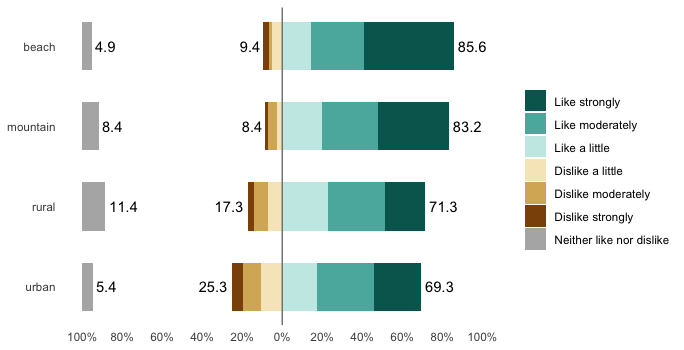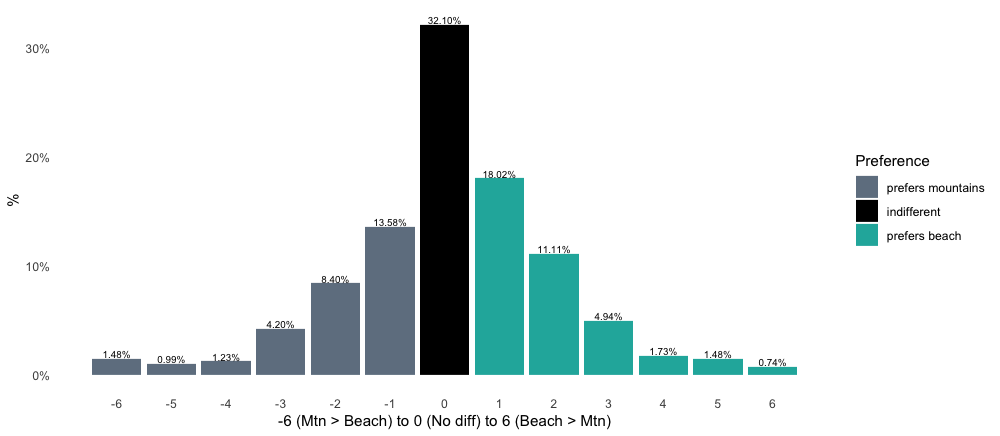What are peoples’ vacation preferences?
NOTE: If you don’t want to read the whole thing, I have “too long, didn’t read” (TLDR) summaries at the beginning of most sections — that being said, I’d love it if you read it all!
TLDR:
Stereotypes exist about “beach” and “mountain” people. I ran a survey to dig into it.
“Are you a beach or mountain person?” This is one of those getting-to-know-you questions that we feel might give us more insight into a person than just where they like to spend their free time. Googling “beach vs. mountain person” led me to a travel blog stating the beach people are highly energetic, restless, adventurous extraverts, whereas mountain people are nature-loving, calm, peace-loving pensive introverts (you get the idea.) I ran a little survey to see if I could shed some data-driven light on the question.
how you ask matters
TLDR:
A journal article asking college students if they preferred the beach or mountains found an overall preference for the beach.
Asking for a preference between them discounts the possibility that they like both.
It looks like it isn’t just travel blog writers (and me) asking these questions — I actually found an article in the Journal of Research in Personality that examined the question of personality and preferences for mountains versus the beach. They were testing the theory that extraverts look for more exciting environments whereas introverts seek out calmer ones. Beaches are typically thought of as more social, crowded, and exciting whereas the mountains are more secluded and peaceful. They asked a sample of 921 college students a straightforward question — “Do you prefer the beach or the mountains?” A majority preferred the beach (72.6% beach to 27.4% mountains.) Asking for a preference between two things is a straightforward approach if you want to choose your vacation destination. However, this approach does have a few weaknesses.
Binary preferences don’t capture preference strength
First, asking which one you prefer is binary, meaning you will only know that they prefer one over the other, not how much they may prefer one over the other. If all things are equal, this isn’t such a big deal. But imagine it is a group deciding. Should people who are indifferent or only have a tiny preference one way have their opinions treated the same as people who have strong preferences? I might have a slight preference for tacos over pizza, but if my friend despises tacos (let’s be honest, this person probably isn’t my friend…), I’m going to get pizza and be pretty psyched about it.
Preferences and attitudes are different
A person preferring one thing over another often tells us next to nothing about how much they like or dislike either thing. To put it in psychology-speak, preferences are not necessarily diagnostic of attitudes. Maybe you prefer the beach over the mountains, but you’d honestly rather not do either (perhaps you’re more of an “ancient ruins” vacationer.) Consider Presidential elections — it is not uncommon that people vote for a candidate they dislike, mostly because they really hate the other option (capturing strength of preference via a method like ranked-choice voting could solve for this… but I digress.)
beach and mountain attitudes
TLDR:
When you ask people to rate how much they like the beach and the mountains separately, most people like both!
People who rate rural areas more positively tend to rate urban areas less positively (and vice versa.)
When I asked people (see appendix for survey sample details) to rate how much they liked or disliked different vacation locations (I also included rural and urban areas in my survey out of curiosity), the results painted a pretty positive picture (these are vacations after all.) As shown in the figure below, a comparable majority of respondents reported liking the beach and the mountains. In fact, the association between favorable beach and mountain ratings was positive, meaning people who rated the beach more positively also tended to do so for the mountains (see figure A1. in the appendix to nerd out!) So if you force people to choose, you will get a preference, but in all likelihood any preferences for one over the other probably has more to do with contextual factors (who you’re going with, time of year, where you live, your last vacation…etc.) than one’s attitudes towards the locations.
Figure 1. The survey question was “How much would you say you like or dislike vacationing at/in the:”
How to read this graph: These are stacked bar graphs, meaning each color reflects the % of respondents choosing that option, and they are stacked next to each-other, with the total % choosing any one of them at the far end (e.g., 85.6% chose one of the “Like” options for the beach.)
Ok, fine. but which do most prefer?
38% preferred the beach, compared to 29.9% who preferred the mountains.
32.1% liked both equally.
It is still worth noting, 2 out of 3 respondents either liked both equally or had only a 1-point difference in preference.
Figure 2. If you’re in the very strange situation of picking a vacation for someone who you know nothing about, then go with the beach.
What do these numbers mean? Preference scores were calculated by subtracting mountain from beach attitudes. This means that if they rated beach a 7 (Like strongly) and mountain a 6 (Like moderately), they’d have a score of 7-6=1 (a +1 preference for the beach.) If both were rated equally they would have a score of 0 (e.g., with a 7 for both beach and mountain, 7-7=0.) If the mountains were a 7 and the beach a 6, that would be a 6-7=-1.
rural and urban attitudes
Attitudes towards rural and urban areas were slightly less overwhelmingly positive (though still showed majorities in favor; look back to Figure 1.) In contrast to the positive association between liking the beach and the mountains, the relationship between rural and urban areas was negative (if you really like cities, you’re less likely to enjoy the country.) Finally, people who liked rural areas were also more likely to like the mountains (which makes sense, as the mountains tend to be more rural.)
Figure 3. If you have to choose a vacation for somebody you don’t know, and it is between a rural and urban setting, this data suggests you bet on rural. But honestly, you might as well flip a coin…
As far a preferences for one over the other go:
40.7% preferred rural, compared to 38.3% who preferred urban.
21% liked both equally.
50% were either equal or within 1-point, still a large group, but there is clearly more distance between preferences compared to mountains/beach.
Do people prefer active or relaxing vacations?
TLDR:
Folks who like mountain vacations tend towards more active vacations. The same goes for people who like cities.
Figure 4. “Do you prefer relaxing or active vacations?“
Most people prefer vacations that tilt towards relaxation (not all survey results can be counter-intuitive — in fact, most probably shouldn’t be.) As far as relationships with location attitudes, there’s an association between liking mountains and preferring more activity, with no relationship to beach attitudes. I’m sure John Muir (of U.S. national park fame) who said, “The mountains are calling and I must go“, approves of this result.
Whereas there was no relationship between activity preferences and ratings for rural areas, data suggest that (perhaps also unsurprisingly), enjoying the city and wanting to be active go hand in hand (Frank Sinatra approves of this result.)
A Nerdy Reference…
Read this for a quick primer on personality and statistics!
If you just want to get to the personality results, feel free to keep scrolling past this part!
A Personality Primer
The Big 5 personality theory is a widely accepted theory of personality that identifies five broad dimensions:
Extraversion: Sociabile, assertive, energetic
Conscientiousness: Organized, dependable
Agreeableness: Warm, sympathetic to others
Emotional stability: Calm, steady
Openness to experience: Curious, imaginative, willing to try new things
These traits are measured on a continuous scale. We dichotomize these traits for the sake of simplicity (e.g., “I’m an extravert/introvert”), but in truth, it is more of a spectrum, with most people falling near the middle. For a more in-depth discussion, watch this video on personality measurement!
A note on correlation
A correlation coefficient (denoted by the symbol r) is a statistical measure of the strength of association between two variables. It ranges from r = -1 (as x goes up, y goes down to the same degree) to r = 0 (x and y are independent) to r = 1 (x goes up, y goes up to the same degree.) Example: the correlation between men’s height and weight is around r = 0.4. If you had to guess who is taller and all you had to go on was weight, you’d probably be right more often than not. In personality psychology, significant correlations tend to range between r = .1 and r = .3. Correlations of this size are not going to be noticeable at the individual level (in fact, you’ll need hundreds of people to notice these patterns!) Finally, always worth noting, just because two things are correlated, does not mean one caused the other!
Personality and vacation preferences
TLDR:
Ratings for the beach increase and mountains decrease as extraversion increases.
The size of this effect is very small — average ratings for even the most extraverted people are still positive for both the beach and the mountains.
Are beach people more extraverted? are mountain people more introverted?
According to the study I mentioned above, people who prefer the beach over the mountains are more extraverted on average. The strength of this relationship would be considered weak, but is also not atypical in personality research (Study 1: r = .18; Study 3: r = .12). In other words, if you have 200 extraverts and 200 introverts in a room together and need to decide which group will prefer the beach on average, absent other knowledge, you should probably pick the extravert group. However, if your friend tells you they’re an extravert, you shouldn’t go straight to assuming that they’re a beach person (this is why psychologists have the annoying habit of always saying “on average” or “in general”.)
The figure below shows the liking ratings for both beach and mountains as personality scores go from introversion to extraversion. These results echo those of prior work — ratings are more positive for the beach and more negative for mountains as extraversion increases. Also note that the difference seems to be driven by more extraverted participants — in other words, it looks like extraverts tend to have a stronger preference for the beach over mountains than introverts have for mountains over the beach.) To compare to previous work I also calculated the correlation between the beach/mountain preference score (beach rating minus mountain rating) and extraversion was r = .12 (i.e., stronger preference for beach over mountains associated with more extraversion) — right on the money with what the prior research found!
Figure 5. “I can have fun anywhere as long as we can go out, but I guess if I had to choose, I’d go with the beach!“ says the extravert.
How to read this graph: “Liking rating” goes from 1 (Dislike strongly) to 7 (Like strongly). Lower numbers mean more introverted/higher numbers mean more extraverted. Each dot is a person’s response (they are jittered a bit to help with visibility.) The lines reflect the best estimate for the average response, assuming the relationship between the two variables is a straight line.
Let’s stop and really think about this result
Now that I’ve gotten the exciting part out of the way, I want to focus you on Figure 5 above once more. Imagine the lines weren’t there — do you think you would be able to discern this pattern from the points alone? Maybe with enough time, but I doubt it. This is a great visual of how tiny correlations can be detected with large enough samples, but also demonstrates what a huge mistake one would make if they were to try to use this result to make any sort of assumptions about individual people! Now look at the lines — notice that they are pretty much restricted to liking ratings between 5 and 6! So on average, you can claim that more extraverted people like the beach more than mountains on average, but you should also remember that they still like the mountains!
What about other aspects of personality?
TLDR:
People scoring high in openness to experience are going to find something to like about pretty much any vacation (though they do tend to want activities!)
Agreeableness and conscientiousness were positively associated with liking both the beach and mountains.
Extraverts like a more active vacation, as they should given the definition of extraversion! This is what us in the biz would call convergent validity.
Openness to experience
Openness to experience is the tendency to enjoy trying new things. People higher in this trait are going to approach situations with a more open mind, excited to see what they discover. Therefore, it is unsurprising that this trait was associated with liking the mountains, rural areas, and urban areas as well as liking a more active vacation! If you’re high in openness, you’re likely to find something exciting and interesting wherever you happen to be going on vacation! (The correlation between openness and beach ratings was not as large as the others, it still was in the positive direction.)
Figure 6. ”Hey, I’m happy with whatever!” says the person high in openness to experience (and consequently not helping anyone make a decision…)
Note: The openness scale starts at 1.5 because nobody had a score of 1.
Agreeableness
Ratings of agreeableness were most strongly associated with more positive attitudes towards the beach. Perhaps this is due to the social nature of the beach and the fact that agreeableness as a trait tends towards a penchant for cooperation and caring for others. Emotional stability was also positively correlated with positive beach attitudes, but it looks like this association was likely driven by the fact that emotional stability is also correlated with conscientiousness and agreeableness.
Conscientiousness
Conscientiousness was most strongly associated with positive ratings towards the beach and to a lesser extent, the mountains. One thing beach and mountain vacations tend to share is a need for organization! People scoring lower on conscientiousness tend to be more disorganized and poorer planners, so I could imagine that beach trips, with all of their packing, planning meals, and lugging all your stuff out to the beach and back, seem like more of a hassle than a vacation! As someone who scores lower on conscientiousness than I wish I did, this hit home. It also might help all you planners better understand those of us who seem exhausted at the mere prospect of making a packing list. That being said, it also isn’t an excuse for being a pain during vacations, so recognize your tendencies and find ways to overcome them! Maybe keep.a separate “go bag” for vacations to reduce the planning burden, or make use of resources that can plan trips for you!
Figure 7. “I hear “staycations” can be really nice…” (he says as he stares at the suitcases, the pile of beach accessories, and the car topper.)
More on Extraversion
Finally, greater extraversion was associated with a preference for more active vacations. Given that extraversion is defined by a penchant for being more socially active, this probably shouldn’t come as a surprise. If you’ll recall, greater activity was also associated with more positive ratings of mountains, which was, in turn, negatively associated with extraversion! How do we explain this seeming contradiction? Well, in short — we contain multitudes! What counts as an active vacation can differ depending on who you are!
So what did we learn?
We replicated prior research that showed that higher extraversion was associated with a preference for the beach over the mountains. We also extended this research to show that this association was largely on the extravert end of the spectrum — introverts were actually pretty equal in terms of preference.
More importantly, we demonstrated that regardless of personality, most people have positive feelings towards the beach and the mountains! There is a lot to offer someone of any personality-type in either location, so it is likely that something as general as “beach or mountains” is going to elicit weak associations with personality. It would be interesting to see if there are particular kinds of vacations that appeal to different personalities. Introverts might have a different ideal beach vacation (perhaps involving evening beach walks and staying in with friends) relative to extraverts (who might prefer going out at night and lots of activities during the day.)
We extended prior work, showing that additional relationships to personality exist when you measure attitudes as opposed to this vs. that preferences. Namely, higher openness to experience is associated with getting along pretty much anywhere! A question this brings to mind for me is whether folks higher in openness might be less excited to go to locations that they have already been to before? We also found that less conscientious folks tend to be less favorable towards beach and mountain trips. My hypothesis here is that these trips are heavy on planning and packing which are not strong-suits for those low in this trait — I wonder if we could make that association disappear if we specified that the trip was all-inclusive and you didn’t need to bring anything?
It is worth remembering that personality is only one very small piece of the human behavior puzzle — humans are complex! But even if it plays a small part, I do hope that I got you thinking about how your personality might play into your everyday attitudes and preferences. And if you are interested in exploring some other questions related to personality and human behavior, let me know (meanwhile, share your favorite vacation spots and I’ll post the results!)
I really enjoy doing these silly surveys and I’d love to be able to do more! While I get some volunteer responses, to get a good sample, I also pay survey-takers. If you enjoy this kind of content and want to see more, please throw a few bucks my way!
Appendix
Survey details
Sample size
405 participants (USA) — originally 421 in total, but I culled 16 participants who had 6 or more (out of 10) identical responses to the personality Q’s.
387 from Cloud Research Crowdsourcing platform
34 from social media (r/samplesize, Facebook, Mastodon)
Demographics
50.4% female; 48.6% male; 0.3% genderqueer; 0.7% did no specify
Median age = 37 (youngest = 18, oldest = 78)
Materials
Personality questionnaire was the BIG5 Ten Item Personality Inventory
Lang, F. R., John, D., Ludtke, O., Schupp, J., & Wagner, G. G. (2011). Short assessment of the Big Five: robust accros survey methods except telephone interviewing. Behavior Research Methods, 43, 548-567.
Correlations
Figure A1. Scatterplots, barplots, and correlation coefficients across vacation and personality variables.









